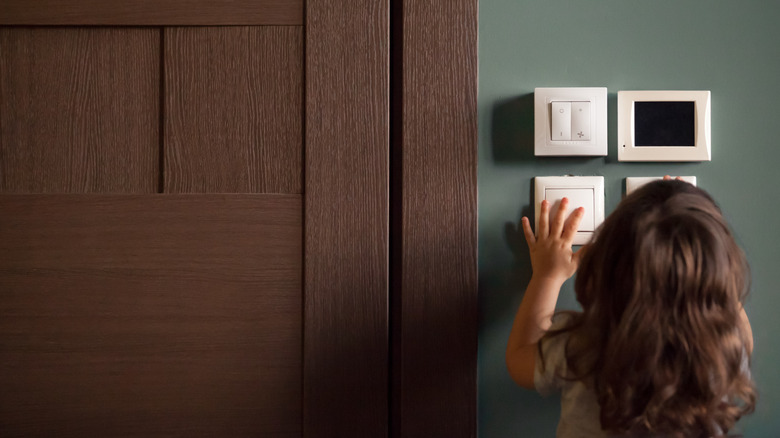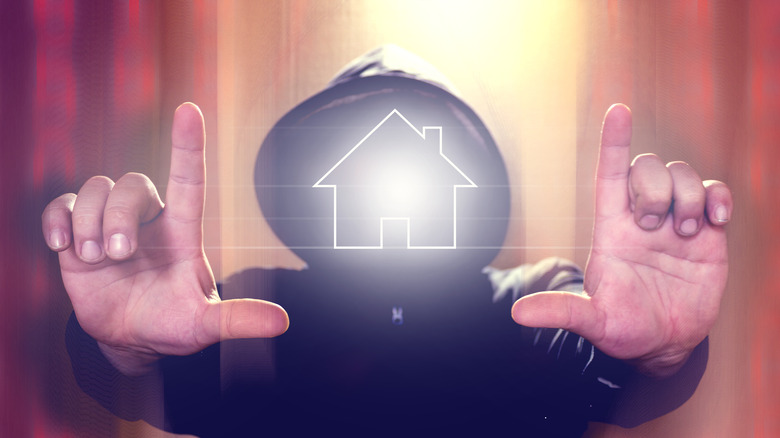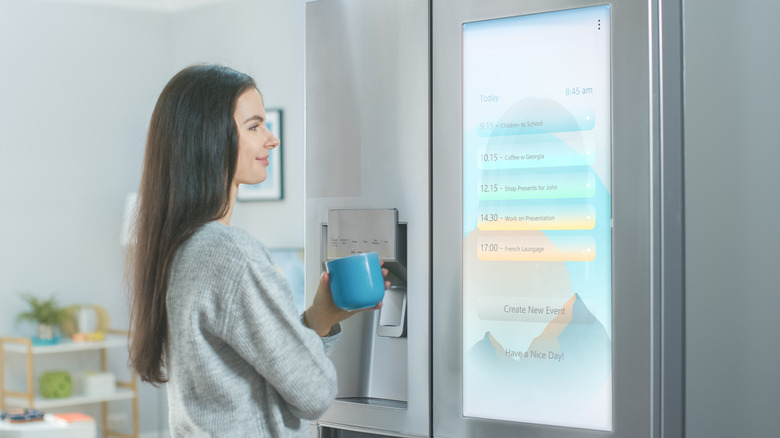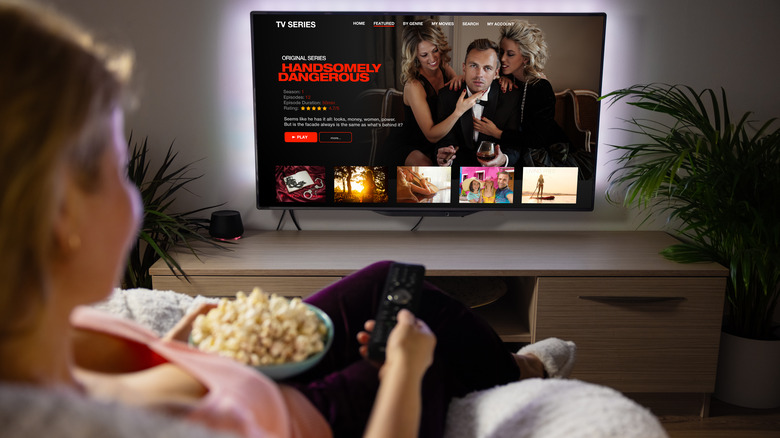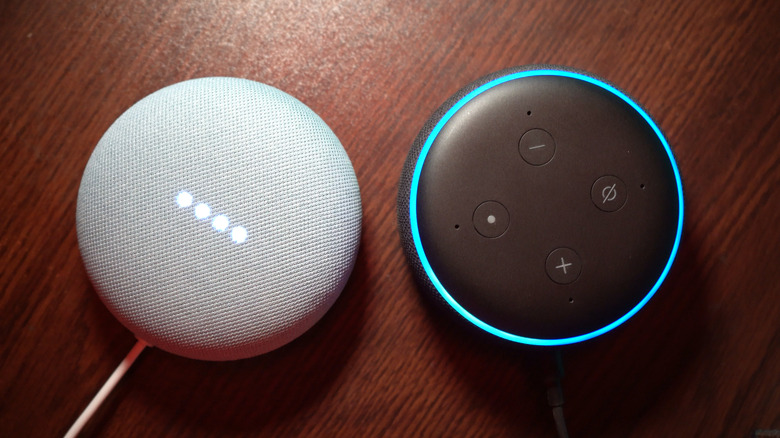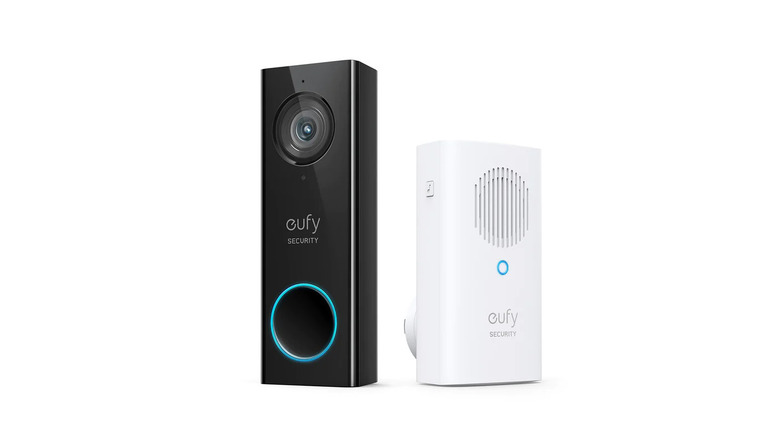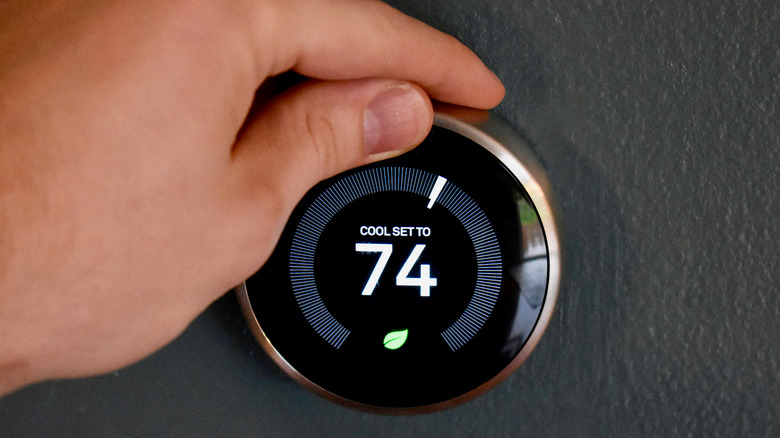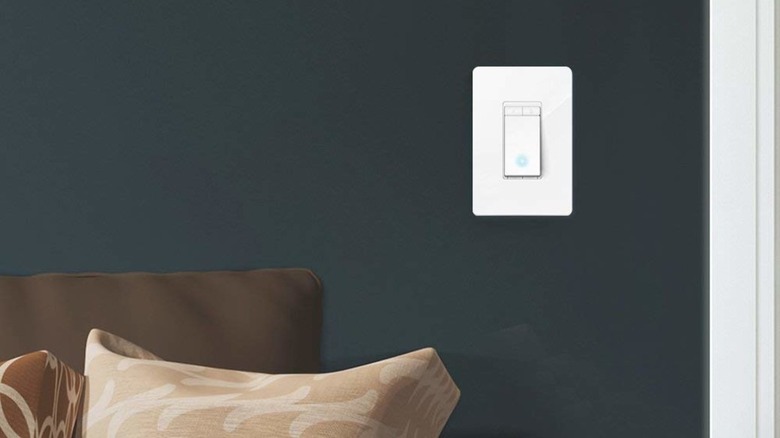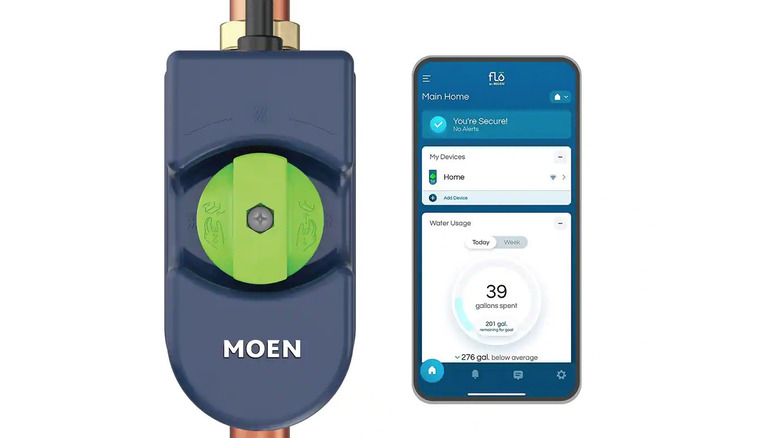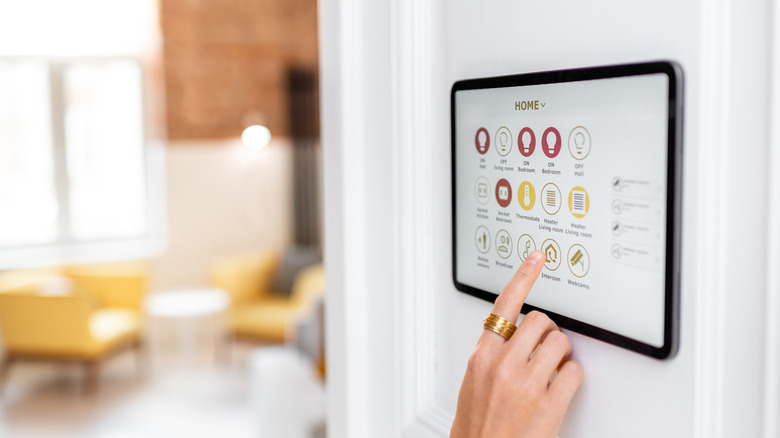Top Smart Home Products For Stubbornly Analog People
We may receive a commission on purchases made from links.
From goofy products to transparent stabs at customer acquisition and retention (and dozens of other major issues), the smart home industry hasn't inspired a lot of confidence from consumers. The things aren't even really all that "smart," with artificial intelligence playing a vanishingly small role to the extent that some have started using terms like "connected home" instead (USA Today). Which, frankly, makes more sense most of the time, since "smart" features are most often about little more than connectedness, app control, and modern conveniences.
Remember, machine smarts can be different from people smarts, and you'll find that occasionally there are truly smart devices — or at least devices designed and engineered well enough to get around most barriers, such as the robot vacuum. The problem is that we can't leave well enough alone, and you can increasingly control many formerly autonomous devices remotely, just for the sake of a bullet point on the product packaging.
What are the objections to smart home tech?
Mistrust weighs heavily on some people, and it's the motivation behind a lot of smart gadget avoidance. We mistrust companies based on broad privacy and security concerns, and on even broader philosophical concerns, such as wondering if technology really needs to control all aspects of our lives. These aren't nitpicky complaints. Computer security company Kaspersky outlines many of these concerns in an understated way, including hackable online devices, excessive data collection, insecure home networks, and dangerous, perpetually insecure smart phones. These and other vulnerabilities lead to problems like data attacks, stolen identities, and hijacked security cameras (via Wevolver). And then there's the cloud's own contributions, which are difficult for individual consumers to prevent. The recent hack of the Plex server's main database, for example, exposed the personal information of over 15 million customers (via Ars Technica).
Concerns about privacy and smart speakers (like Amazon's Echo) have been raised for years, and a company called Paranoid now sells a service to literally hack your hardware and replace it with a more privacy-protected system, among other, simpler measures. But sometimes, the resistance to smart tech is just a sensible reaction to an industry that has gone slightly overboard with products that are complex and expensive, and systems that are a moving target of chaotic standards, services, and capabilities.
What's not okay
Consider the Digital Trends round-up of "The best smart kitchen appliances for 2022." The benefits of its "best" products include instructing your microwave by voice rather than punching in a time, controlling a sous vide by app rather than by the controls on the device, and running your dishwasher remotely (in case you forgot to, perhaps?). The Samsung FamilyHub Refrigerator will let you see inside your refrigerator from anywhere you have your smartphone handy. (We recommend staff meetings.) You can also control the fridge with voice commands — but no word on why you suddenly need to "control" a refrigerator.
Then there's the Keurig K-Supreme Plus Smart, the company's initial foray into connected coffee makers. Keurig has always been a bit polarizing. Sabrina Embler described the Keurig as a huge, fragile, messy environmental disaster of a machine that produces weak and tasteless coffee for which you pay as much as $50 per pound (via Wirecutter). But the new K-Supreme Plus Smart allows you to tailor its brewing to the particular pod you are using based on expert-guided downloadable settings, among other new features. Reading through some of the 115 one-star reviews on the Keurig site reveals some worrisome trends, including users finding it difficult to maintain a Wi-Fi connection, reports that the machine is slow to recognize when it is in use (leading to unnecessary re-orders), and many more tech-related complaints. In this sense, Keurig appears to have taken a device designed for simplicity of use and made it more difficult by adding smart tech.
When the devices are okay
Okay, fair enough, let's not throw out the baby with the Smart Self-Throw-Outting Bath Water. There's a pretty good chance you're already using some smart devices, and some of them quite a lot, but you might not even think of them as "smart." A perfect example of this is your TV. Odds are you already have a smart TV, which is simply a TV that is internet-connected and usually runs apps of some flavor. If you have a Roku, Fire TV, Android TV, WebOS (LG), or Google TV-enabled device, you're already using a smart TV, according to PCMag. And that's okay, because the technology checks the boxes for a smart home technology that even smart home haters can love: mature tech that works well, not over-complicated to install or use, meets all core needs without a subscription, and performs functions that the user would have been doing anyway, just now with some bonus features.
The only remaining criterion for Luddite-friendly smart tech is that it functions fully without depending on the cloud. Smart TVs automatically fail that test because they are cloud devices by definition, and wouldn't be of much use without it. But in most other cases, cloud dependence comes with concerns about security, loss of control, and being locked in to a particular vendor (via Park Place Technologies). Cloud or subscription requirements can become a real problem for smart homes when the service is discontinued, which is fairly common, or when terms of service change unexpectedly, etc. Cameras, security systems, and smart home hubs are well known for requiring cloud access, but there are options on the market that reduce or eliminate this requirement (via Home Alarm Report).
TCL 5-Series 4K Roku TV
TVs are an obvious place to start, especially if you're already planning to buy a new one. As we said before, all TVs are pretty much smart TVs these days. Consider the TCL 5-Series. Available with Google TV or Roku TV, the TCL has an impressive set of features for the price — starting with the Google TV/Roku TV option. TechRadar has generally been positive about the Roku streaming devices, but has complained that the interface is designed for less tech-savvy users and hasn't kept up with devices like Google TV. The 4K QLED display delivers exceptional color fidelity. The 5-Series gets 4.6 out of 5 stars on Amazon, and only 20 of those 6498 reviews mention that it's a smart TV.
So, is it really smart? Well, yes. The Home Assistant integration, for example, lets you completely control the TV, including the ability to play video from URLs directly. The integration allows you to use security and other cameras using HTTP Live Streaming (HLS) and the PlayOnRoku app. So, if you wanted to show your doorbell camera on the TV when someone rings, no problem. If you want to shut off your TV or switch it to C-SPAN at bedtime, it is perfectly doable (via Home Assistant). But if you want to ignore all this smart stuff and just watch a show, the TCL does that well.
Google Nest Mini
Why on earth would you put what's often called a "smart speaker" on a list of products for people who have reservations about smart home technology? Two reasons, both related to our rule that a device should help you do things that you'd be doing anyway, but better. Those things are looking stuff up (the devices' role as personal assistant) and listening to music (the devices' role as a speaker).
You could reasonably replace the Google Nest Mini with Amazon's Echo Dot without losing much. In fact, it's entirely possible that you should. While the Nest Mini is smaller and has a slight edge in smarts and language interpretation, it doesn't have an audio output jack and is not as loud as the Echo Dot (via Digital Trends). Neither is going to blow you away with sound fidelity, but a digital assistant that can't understand you is a perpetual frustration, so we weighted the smarts and language interpretation slightly higher.
The products' differences as smart home devices, on the other hand, we were less concerned about. Yes, Echo supports 85,000 smart devices (in case you need a staggering array of ways to open your garage door), and the Nest handles a bit more complexity. Going forward, both Amazon and Google have pledged to support the emerging Matter standard, so if you happen to start caring about smart home stuff, both devices will probably serve you just fine.
Eufy Video Doorbell
Ring dominates the mart doorbell market, but they also price their products like they're the only option out there. Not so. Enter, the Eufy Video Doorbell. Comparable to the Ring Video Doorbell 3, the Eufy is cheaper. The Ring has 4.6 out of 5 stars at Amazon, versus Eufy's 4.4 stars, but where the Eufy really shines is in two of the areas of most concern to smart home objectors: privacy and subscriptions.
Ring has slightly better specs in some areas you might not care about (such as interchangeable faceplates and 5GHz wireless support), but Eufy allows you to store your videos locally and never transmits them to the cloud. Ring does store video in the cloud for subscribers, and while the video is encrypted, there might still be causes for privacy concerns (via Android Central). But did you catch that key word in the last sentence? Ring's storage is based on an optional subscription plan, without which your videos aren't stored at all. The lack of historical footage is a serious problem for a video camera product, and having a cloud subscription opens you to the possibility of a lot of mishaps down the line.
Nest Thermostat
Nest was one of the first companies to break through to the mainstream with smart home devices. This might be because the utility of the devices (energy optimization and comfort) outweigh the potential downsides in consumers' minds, says Inc. editor Graham Winfrey. This suggests that at least some percentage of customers can be won over with a good feature set, and by knowing where they draw the line about acceptable and useful capabilities.
Fast forward to today, and Google's Nest Thermostat is the entry-level younger sibling to the Nest Learning Thermostat, but it does most of the things you want and skips the "smarter" features that you might be less enchanted with. It's programmable and has the ability to reduce your heating and cooling bills. It suggests improvements to your programmed schedule in order to recognize even more savings. And you can adjust the thermostat remotely, which is great for that moment you realize that you left for vacation without turning down your AC. While a regular thermostat can work just fine, smart thermostats, lie the Nest, do it a little better — without letting the smarts get in the way.
Kasa Smart Wi-Fi Light Switch Dimmer and Mini Plugs
TP-Link's Kasa Smart Wi-Fi Light Switch Dimmer is about as affordable as a non-smart dimmer, and yet it packs some useful additional features. If you don't need the dimming, you can save a few more dollars by going with the Kasa Smart Light Switch instead. What is does, basically, is let you schedule when the light is on or off, and it also lets you control the switch remotely with your phone.
For about a third of the price of the Amazon Smart Plug, which restricts you to the Amazon Alexa ecosystem, you can get TP-Link's Kasa Smart Wi-Fi Mini Plugs, which turn most standard receptacles into a remote-controlled outlet that offers the same features as the switch. Yes, you can control these by voice with Alexa and Google Assistant, and the switch works with Microsoft Cortana (we're looking at you, one guy who still uses Cortana because Halo). But, basic smart switches and plugs are an incremental improvement over analog timers and The Clapper. Save yourself a trip back home to unplug your iron when you're supposed to be in a meeting.
Tie: D-Link Smart Wi-Fi Leak Sensor & Moen Flo Smart Water Monitor and Shutoff
When it comes to leak detectors, we have not one recommendation, but two! D-Link's Whole Home Smart Wi-Fi Water Leak Sensor Kit detects standing water with up to 17 sensors (one attached wire and 16 optional wireless sensors). It operates like modern smoke detectors in that it links together many devices and will alert you if it loses power. The Moen Flo Smart Water Monitor and Shutoff device works differently from most leak detectors, in that it monitors water from the flow side instead of sitting around waiting for water to start pooling on your floor. It also has some truly smart functionality, and can work in conjunction with Moen's confusingly named Flo Smart Leak Detector, which works like the D-Link. Why bother with these smart devices? This is how you catch leaks as early as possible without patrolling with a moisture sensor every day. Smart or not, you can't do it any better.
Two more that could have made the cut
The U by Moen Smart Faucet sounds ridiculous, but consider this sentence: "Alexa, ask Moen to dispense one cup of 112-degree water." This is not only a good way to activate some yeast for bread-making, but it's just the tip of the iceberg for the U by Moen faucets. Really, it has nothing to do with smart home tech — it has to do with dispensing water in a new and useful way. But the very idea of smart plumbing, combined with the Moen's price tag, are a bridge too far for hesitant buyers.
Rumors have begun popping up insistently about the possible return of the Chromecast Audio (via Android Central), at which point we... started... writing... very... slowly in hopes of including a new Chromecast Audio in this list. When Google killed the Chromecast Audio, it made the unique decision to abandon its position as the most affordable, high-quality, whole home audio solution, on par with Sonos, but at a much lower price. These kinds of maddening decisions are extremely common, and contribute to consumers' shrinking away from smart home devices. ZDNET's Jason Perlow bemoaned this forced obsolescence in his compelling case for standardization and interoperability three months before the Matter project was announced to do just that.
What's the Matter with waiting for smart home gadgets?
They might as well have named it Pun. The emerging smart home standard called Matter invites constant wordplay, but it does some real work as well. In 2019, this alliance of many industry companies set out to define how smart home devices should work with each other to maximize capabilities and minimize frustration (via Wired). It's been delayed a few times, but, according to The Verge, and is currently slated for a fall 2022 release.
Should you wait for this new standard to be released and implemented before investing in any smart home gadgets? The short answer is no. Participating companies are already future-proofing their products against the launch of Matter, so newer devices you buy today will be ready when Matter fixes everything by eliminating some channels to competition, like creating value in proprietary ecosystems, while generally lowering barriers to entry (via Consumer Reports), so that any startup with an offshoring plan and a UL listing can tell your toaster and porch light what to do. But really, Matter should make things better, and most of the things you buy today will work just fine after it's announced and implemented.
What if I love the tech, but not the industry?
Modern Luddites aren't the only people who shy away from smart home products. Sometimes, it's the most tech-savvy people among us who most wisely fear the corporate intrusions and privacy concerns associated with cloud and subscription-based products. We're talking the products that comes without protections against, say, turning a camera on without permission, or capturing detailed personal and demographic information about our kids.
For these people, we offer the completely opposite advice: set up the most capable, complex platform you can and do everything yourself. Control centers like Home Assistant allow you to integrate almost anything and give you complete control — at the price of many hours spent tweaking and refining pretty much everything. Peruse the list of sensors available via just one Home Assistant integration (via ESPHome), and if this list terrifies you, it might be best to stick with simpler hobbies like lawn darts or memorizing baseball stats. But, if you want to spend three weeks figuring out the best way to know if it's hot in your attic, smart home technology will always be waiting for you.
